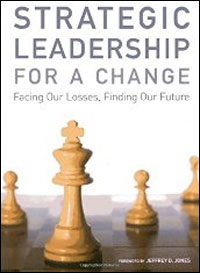Church leadership literature often seems lacking in psychological depth. It feels Machiavellian in its world view and behaviorist in its focus, particularly if your seminary preparation and your daily practice of ministry focus on the care of souls. Does the Jerusalem of your education and practice really have nothing to do with the Athens of the pressing contemporary call to church leadership?
“A key challenge for leaders,” writes McFayden, “is guiding a process through which congregations can grieve their losses …” Only when that capacity emerges will the congregation be ready to embrace a new vision of itself.
In Strategic Leadership for a Change: Facing our Losses, Finding our Future (Alban Institute, 2009) Ken McFayden argues convincingly that one of the most common pastoral practices — helping people who grieve — can be a source of wisdom for congregational leaders. Drawing principally on the writings of British psychiatrist and psychoanalyst John Bowlby, McFayden analyzes our lifelong and instinctive practice of attaching ourselves to people, places, and things. Attachments give us a secure base for growth. When objects of attachment are threatened, we are thrown into anxiety. When they are taken away, we succumb to grief.
McFayden applies attachment theory to the corporate behavior of congregations. He coaches the leader to study the congregation’s losses — the occasional losses of favored leaders and beloved buildings, but also the more insidious losses of membership, standing in the community, and the centrality of the church to its members. What is the impact of these losses on the congregation? How is the congregation grieving its losses, knowing that grief is neither as clean nor as linear as we would like it to be? “A key challenge for leaders,” writes McFayden, “is guiding a process through which congregations can grieve their losses and develop a  capacity to attach anew.” Only when that capacity emerges will the congregation be ready to embrace a new vision of itself.
capacity to attach anew.” Only when that capacity emerges will the congregation be ready to embrace a new vision of itself.
McFayden’s insights about congregational transformation resemble those that Ronald Heifetz and John Kotter have applied to other organizations. Conghttps://www.churchleadership.com/wp-admin/post.php?post=2849&action=editregations do not like change and will try to avoid it. Congregations prefer easy answers to facing the anxiety of real change. Pacing is everything in leading change. A congregation’s viability is measured by its capacity to let go and take up. McFayden provides a credible “why?” to such behavior and draws a meaningful connection between good care of souls and good transformational leadership.
Strategic Leadership for a Change: Facing our Losses, Finding our Future (Alban Institute, 2009)by Ken McFayden is available through Cokesbury or Amazon







